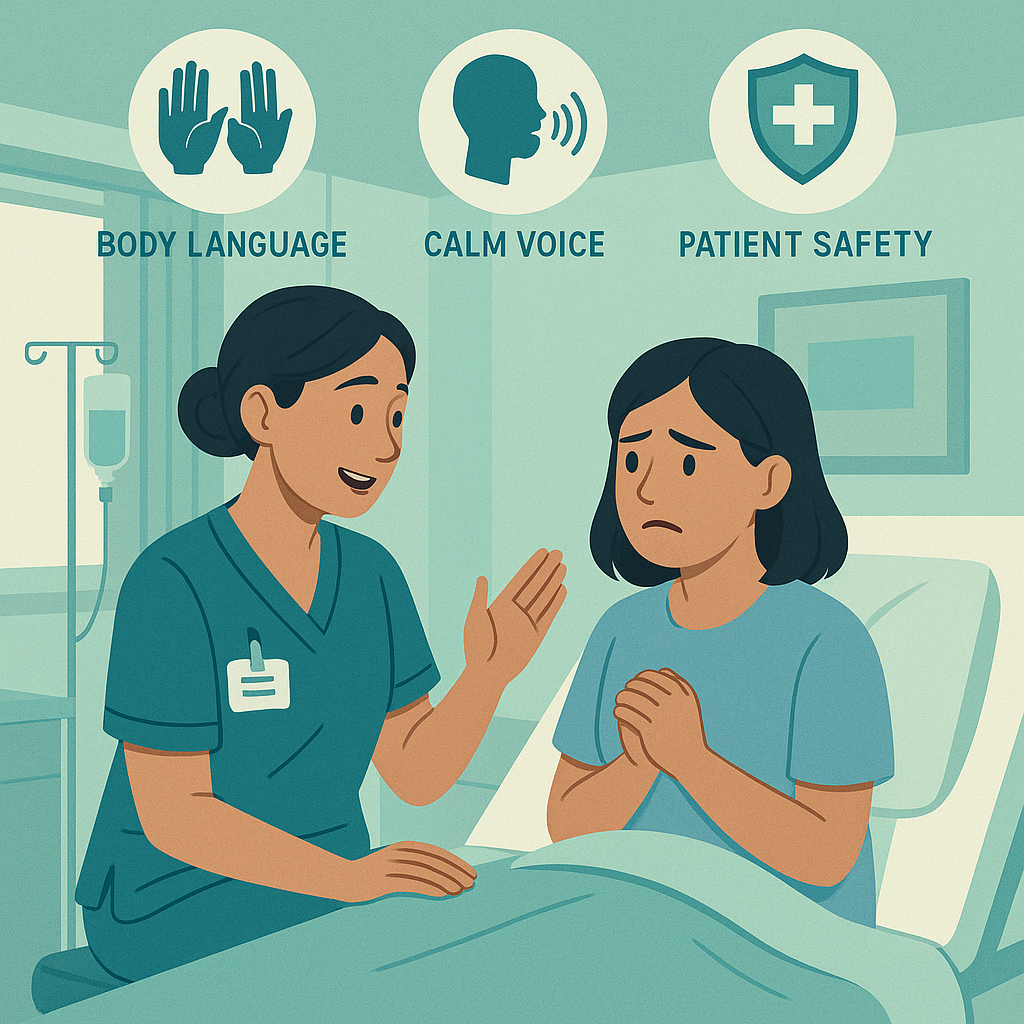Managing agitated or aggressive patients is a critical skill that every nurse must master. Whether you’re on the hospital floor, in the emergency department, or preparing for the NCLEX, knowing how to de-escalate tense situations safely can protect both you and your patients. Moreover, this skill is often featured in nursing bundles, NCLEX prep materials, and real-world clinical training because it’s vital for maintaining both patient and staff safety.
Therefore, this practical guide is designed for registered nurses (RN nurses), student nurses, and new grads alike. Let’s break it down step by step.
📌 Why De-Escalation Matters in Nursing
Patients can become agitated for many reasons — pain, fear, confusion, withdrawal, mental illness, or medication side effects. As the frontline caregiver, the nurse is usually the first to notice a change in behavior and must act quickly.
In fact, de-escalation techniques help:
- Prevent harm
- Reduce stress and fear
- Maintain a safe environment
- Build trust and rapport
Ultimately, using these techniques keeps everyone safe and promotes therapeutic communication.
🧠 Signs That a Patient Is Becoming Agitated
Early recognition is key. Therefore, look for these warning signs before the situation escalates:
- Raised voice or yelling
- Pacing or restlessness
- Clenched fists or jaw
- Rapid breathing
- Verbal threats or intense eye contact
- Refusing care or instructions
For RN nurses and NCLEX candidates, these red flags often point to the need for immediate therapeutic intervention. In other words, identifying agitation early can prevent a full-blown crisis.
🩺 Step-by-Step Nursing Guide to De-Escalation
✅ Step 1: Stay Calm and Safe
Take a deep breath and remain composed.
Keep a safe distance.
Position yourself near the door, never cornered.
Call for help early — use a staff alert or code if needed.
Remember, safety always comes first. If a situation feels unsafe, then prioritize calling for help rather than trying to handle it alone.
✅ Step 2: Use Non-Threatening Body Language
Keep your hands visible.
Don’t cross your arms or point fingers.
Make gentle eye contact.
Use a soft, steady tone.
Additionally, avoid sudden movements or facial expressions that might appear confrontational. After all, your posture and voice often matter more than your words.
✅ Step 3: Acknowledge Their Feelings
Use therapeutic communication — a key topic on the NCLEX and in every nursing bundle.
Say: “I can see you’re upset.”
Avoid saying: “Calm down!” or “Stop yelling!”
By doing this, you show the patient that you’re listening, not judging. As a result, the patient often feels more understood and less defensive.
✅ Step 4: Set Clear Limits
Speak slowly and clearly.
Use simple statements like:
- “I want to help you, but I need you to lower your voice.”
- “You’re safe here. Let’s talk about what’s bothering you.”
On the other hand, avoid engaging in power struggles. Instead, focus on collaboration, not control. Consequently, this encourages cooperation and reduces escalation.
✅ Step 5: Offer Choices When Possible
Giving the patient some control can reduce aggression.
- Example: “Would you like to speak here or in a quieter area?”
- Example: “You can take your medication now or in 10 minutes. What works better for you?”
In addition, offering choices gives patients a sense of autonomy, which can significantly decrease tension. This approach is often tested on the NCLEX, since patients respond better when they feel respected and heard.
✅ Step 6: Monitor and Document
Once the patient is calmer:
- Document behavior and your interventions.
- Notify the healthcare team.
- Update the care plan to prevent future episodes.
Moreover, accurate documentation protects you legally and helps other team members understand the patient’s behavioral patterns. As a result, future interventions become more effective and consistent.
📚 NCLEX & Nursing Bundle Review: Key Dos & Don’ts
| ✅ DO | ❌ DON’T |
|---|---|
| Use calm, simple language | Argue or raise your voice |
| Give space and keep exits clear | Corner the patient |
| Offer realistic options | Threaten consequences |
| Get help early | Handle dangerous situations alone |
| Document everything | Ignore early warning signs |
In summary, these strategies are frequently highlighted in NCLEX scenarios and nursing bundle reviews because they represent evidence-based best practices for safety and communication.
🧑⚕️ When to Escalate for Safety
If the patient becomes physically violent:
- Activate a Code Grey or similar facility code.
- Use physical restraints only as a last resort and always per policy.
- Ensure continuous monitoring if restraints are used.
However, remember that restraints should never be your first response. In fact, according to NCLEX principles, restraints are always the last option — de-escalation must come first.
✅ Key Takeaway
De-escalating an agitated patient is one of the most essential — and challenging — tasks for any nurse. Nevertheless, with the right approach, RN nurses can defuse tension, ensure safety, and build trust.
In conclusion, these communication and safety skills are not only tested on the NCLEX but also serve as a foundation for professional nursing practice. Therefore, make sure to add de-escalation to your nursing bundle of essential skills — it can save lives and protect your career.

